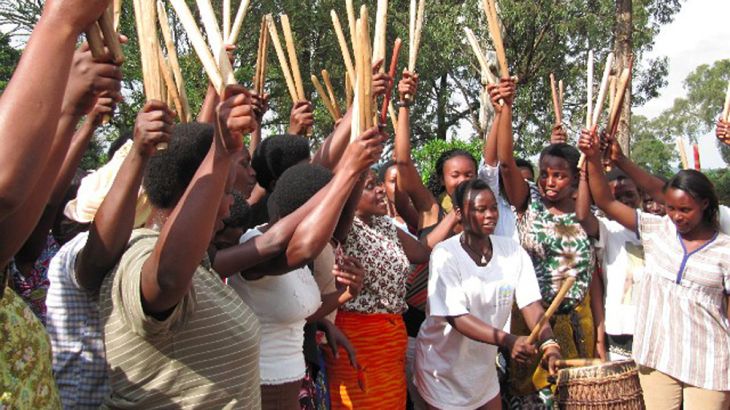
Rwanda: Sweet Dreams
How ice cream and drumming helped heal some of the scars of the Rwandan genocide.
Ten years ago, in November 2006, Al Jazeera English was launched. To mark that anniversary, we’ve created REWIND, which updates some of the channel’s most memorable and award-winning documentaries of the past decade. We find out what happened to some of the characters in those films and ask how the stories have developed in the years since our cameras left.
In 1994, at least 800,000 Rwandans were killed as Hutus and Tutsis turned against one another.
Keep reading
list of 4 itemsRussian playwright and director go on trial over ‘justifying terrorism’
‘Nothing left’: How climate change pushes Indigenous people from their land
‘Refuge of the last dreamers’: Luang Prabang, a city suspended in time
I never like to describe ourselves as Hutus and Tutsis, and we never came together as Tutsi and Hutus. We came as women. But we were also different. We had kids of perpetrators, we had widows, we had orphans, but this was not relevant on the stage.
Ten years later, playwright Odile “Kiki” Katese founded Rwanda’s first all-women drumming group with women from both sides of the conflict. The project had the twin goals of healing and empowering women, and was so successful that it evolved into a performing group, Ingoma Nshya.
Invited to the Sundance Institute Theatre Lab in 2009, Kiki met Jennie Dundas, an actor and co-founder of an ice cream shop in Brooklyn, New York called Blue Marble.
With few employment opportunities in Rwanda, Kiki proposed opening Rwanda’s first ice cream shop, and asked the Blue Marble team to teach them how.
As revealed in this Witness documentary, what followed was a remarkable story about the genocide, a troupe of female percussionists and the healing power of ice cream.
REWIND recently caught up with Kiki Katese to find out what happened after our cameras left.
“The icecream shop is doing well,” Kiki says. “It’s not yet profitable, but it’s sustainable. And Rwandans are learning to love icecream because we don’t eat cold [food] naturally, culturally. But most of the time you can see many tourists who have watched the film and then they make a committment to come to Butare to see the shop, and also you can see a father with a bike bringing once maybe in a year the kids to have icecream … because even if we made efforts to make it really cheap, it’s still very expensive for the local people.”
Kiki says today Rwanda has changed a lot.
“Now we are really working for peace and reconcilliation and unity and harmony and tolerance also,” Kiki says.
“And for the women’s perspective, I would not like to say that the genocide finally turned, really transformed their lives because they became after the genocide active members of the society. They didn’t have a choice, they didn’t make that choice, but they had to play that role because of the genocide.”